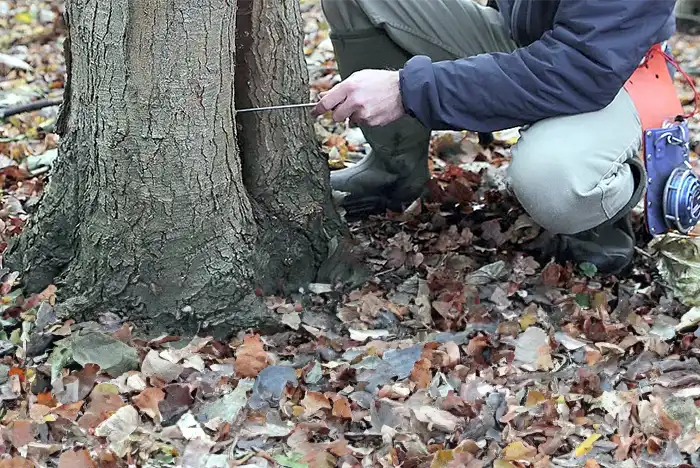Our Tree Survey Service in Gloucester
Looking for tree survey services in Gloucester? We provide comprehensive tree report services in Gloucester, extending our expertise to both residential and commercial clients throughout areas like Quedgeley and Barnwood and beyond.
We conduct a detailed inspection of each tree, using modern techniques to spot signs of disease, decay, or structural problems before they become hazards. Our team is prepared to handle everything from simple health checks to more specialized assessments, such as BS5837 surveys for new construction. Once issues are identified, we recommend tailored solutions, ranging from selective pruning and monitoring to complete removal if necessary for safety.
Tree surveys also highlight ecological benefits, guiding responsible management to preserve habitats and support biodiversity. By combining professional expertise with respect for the environment, we help you maintain a safe, attractive, and sustainable property for years to come.
Contact us today for tree survey services

Importance of Tree Surveys
Tree surveys play a vital role in assessing the condition of individual trees and overall landscape health. They help identify safety hazards, such as weak branches or disease, before they become serious problems. Surveys also provide information for planning applications, ensuring that development projects are carried out responsibly and in line with regulations. Furthermore, they give property owners insights into the longevity and maintenance needs of their trees, which can be crucial for budgeting and future planning. Conducting a thorough survey supports risk management, meets legal obligations where applicable, and encourages healthier environments for both people and wildlife.
Types of Tree Surveys
Different situations call for various types of surveys. A BS5837 survey is often required for construction or development projects, evaluating how proposed building work may affect nearby trees. Mortgage surveys may be needed by lenders who want assurance about the stability of large trees close to a house or building. Health assessments focus on checking for disease, pest infestations, or structural weaknesses that could pose immediate risks. Each survey type has a specific purpose but shares a common goal of ensuring that trees are managed responsibly. By choosing the right survey, property owners and planners can make well-informed decisions about tree care and land use.

Survey Methodology
When conducting a tree survey, we combine visual inspections with modern tools to gather accurate data. Our team measures trunk diameter, checks branching patterns, and looks for decay or cracks that might indicate stress. We note the tree’s species, approximate age, and any visible pests or diseases. In some cases, specialized instruments are used to test the internal structure of the trunk or large limbs. Once we collect our findings, we compile them into a detailed report with recommendations for maintenance, further testing, or possible remedial actions. This systematic approach ensures that every tree is evaluated carefully and consistently.
Common Issues Identified
During a tree survey, it is common to discover problems like fungal infections, insect infestations, and root damage. Structural issues may include cracks, splits, or weak branch attachments that could lead to limb failure. In addition, trees sometimes grow too close to buildings, power lines, or roads, raising concerns about safety and damage to property. Lack of proper pruning can also cause overcrowding, making trees more susceptible to storms or disease. Identifying these issues early on allows property owners to address them before they escalate into bigger and more costly problems.

Recommendations & Next Steps
After gathering and interpreting survey data, we offer clear guidance on the best way forward. This might involve pruning branches to improve stability, treating trees for pests or disease, or removing a tree that poses a safety threat. We can also advise on suitable replacement species if removal is necessary. Long-term maintenance plans help ensure that trees remain healthy, providing ongoing benefits to the property and the surrounding environment. By following these recommendations, homeowners and businesses can preserve the aesthetic and functional value of their green spaces.
Environmental & Ecological Considerations
Trees are important for local wildlife, air quality, and soil stability, so our surveys always account for the role they play in the broader ecosystem. Certain trees may provide nesting sites, support rare species, or serve as a critical part of the local habitat. When we identify such trees, we carefully plan how to protect them and minimize disruption to wildlife. Recommendations may include scheduling any necessary work outside of nesting seasons, preserving enough canopy for shade and shelter, and using eco-friendly treatments where possible. Through thoughtful management, property owners can maintain both the health of their trees and the biodiversity that depends on them.
Contact Us
The Gloucester Tree Surgeon is here to help you survey and assess your trees.
Feel free to reach out to us with any inquiries about tree care, and we will gladly provide guidance on the most suitable course of action, free of charge and with no obligation.
We also offer site clearance, tree removal, hedge trimming, tree surveys, tree moving, grounds maintenance and stump grinding.
Email Us
contact@gloucesterstreesurgeon.co.uk
Operating Hours
Monday : 24 Hours
Tuesday : 24 Hours
Wednesday : 24 Hours
Thursday : 24 Hours
Friday : 24 Hours
Saturday : 24 Hours
Sunday : 24 Hours
Emergencies
OUR Locations
Our team provides its tree work throughout Gloucester including Abbeymead, Longlevens, Quedgeley, Kingsway, Abbeydale, Barnwood, Brockworth, Hucclecote and Tuffley.
